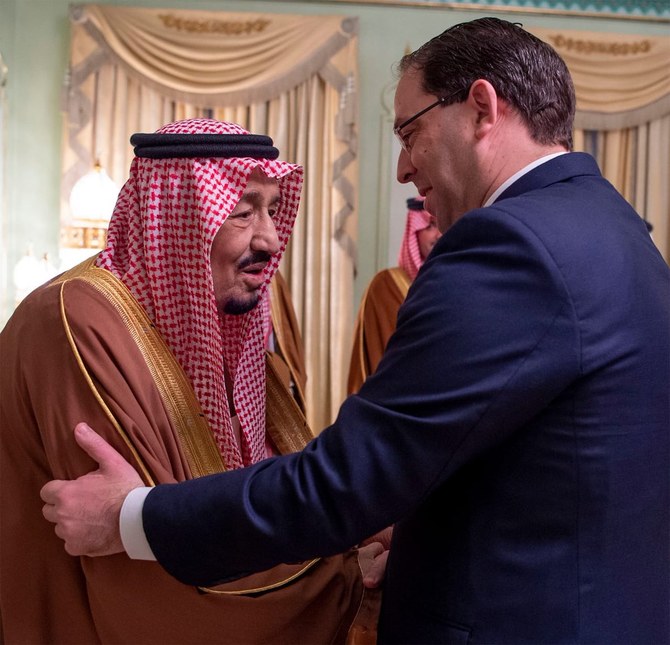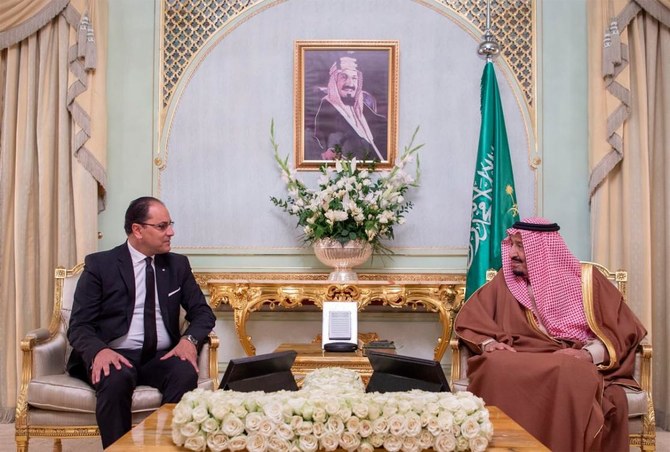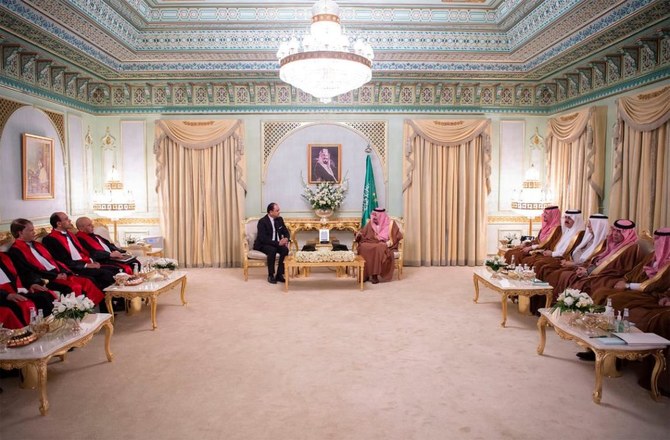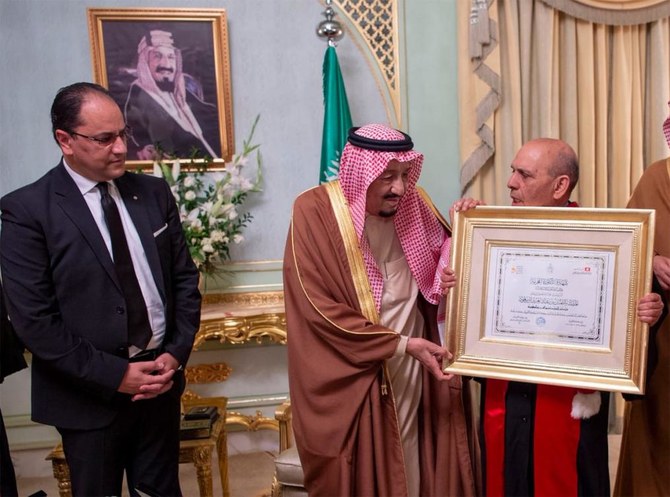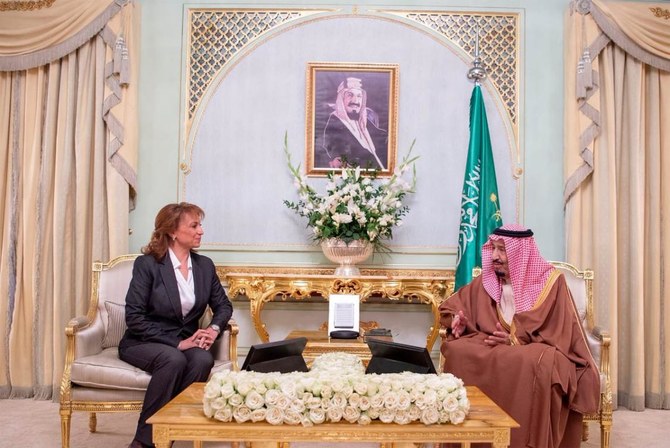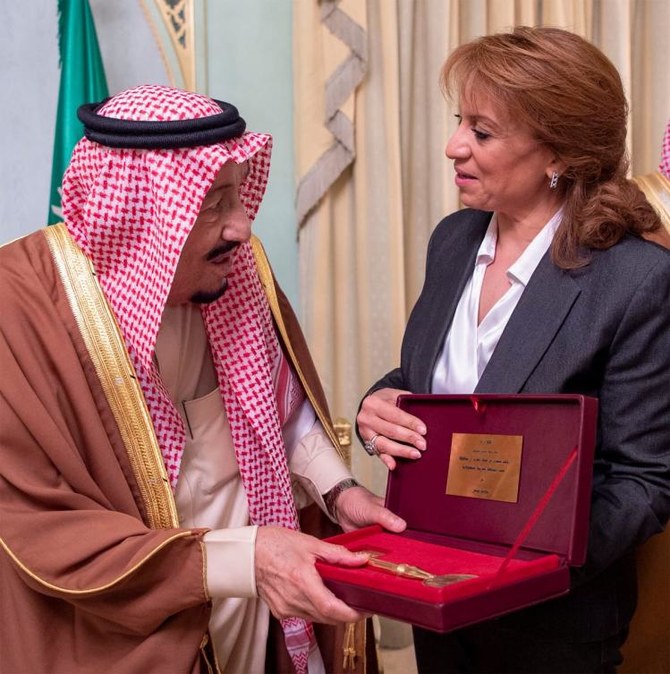TUNIS: King Salman received Tunisian Prime Minister Youssef Chahed at his residence in Tunisia on Saturday.
Chahed welcomed the king in Tunisia, describing the visit as a historic one. The monarch, who will head the Saudi delegation at Sunday’s 30th Arab League Summit in Tunisia, expressed happiness at his visit, and reaffirmed the depth of fraternal relations between the two countries.
They discussed cooperation in various fields, ways to enhance and develop bilateral ties, and regional and international developments.
On the Saudi side, the meeting was attended by Interior Minister Prince Abdul Aziz bin Saud bin Naif, Minister of State Dr. Musaed Al-Aiban, Foreign Minister Dr. Ibrahim Al-Assaf, Commerce and Investment Minister Majid Al-Qassabi, Finance Minister Mohammed Al-Jadaan, Media Minister Turki Al-Shabanah, Minister of State for African Affairs Ahmed bin Abdul Aziz Qattan, and Ambassador to Tunisia Mohammed bin Mahmoud Al-Ali, among other officials.
Meanwhile, King Salman received an honorary doctorate in Arab and Islamic civilization from the University of Kairouan.
He received the doctorate during his meeting with Tunisian Minister of Higher Education and Scientific Research Dr. Slim Khalbous and the university’s rector Dr. Hammadi Massoudi, among others.
The king also received the Golden Key of Tunis during his meeting with the city’s Mayor Souad Abdelrahim, who expressed her pride in his visit. The monarch thanked her and expressed pleasure in receiving the key.
Al-Qassabi met with Tunisian Commerce Minister Omar Behi. They discussed ways to boost bilateral ties in various fields, and issues of mutual interest.
King Salman and Tunisian PM hold talks
King Salman and Tunisian PM hold talks

- King Salman received an honorary doctorate in Arab and Islamic civilization from the University of Kairouan
- The king also received the Golden Key of Tunis during his meeting with the city’s Mayor Souad Abdelrahim, who expressed her pride in his visit.
Saudi Cabinet discusses Syria, Lebanon and Kingdom’s success at WEF

- Crown Prince Mohammed bin Salman briefs members on telephone call with US President Donald Trump
- Foreign Minister Prince Faisal bin Farhan visited Damascus and Beirut last week for talks with the new Syrian ruler and Lebanese president
RIYADH: The Saudi Cabinet on Tuesday discussed the outcomes of Foreign Minister Prince Faisal bin Farhan’s visits to Syria and Lebanon last week.
The prince met newly elected Lebanese President Joseph Aoun in Beirut and the new Syrian ruler, Ahmed Al-Sharaa, in Damascus.
The Cabinet session in Riyadh was chaired by Crown Prince Mohammed bin Salman, who briefed members on his telephone conversation with new US President Donald Trump last Wednesday, and his meeting with Italian Prime Minister Giorgia Meloni on Sunday during her visit to AlUla.
After the session, Minister of Media Salman Al-Dossary said Saudi diplomacy supports Syria and Lebanon, and the efforts to restore their rightful positions within the Arab and international communities.
Cabinet members also praised the work of the Kingdom’s delegation at the annual World Economic Forum summit in Davos last week. Several Saudi ministers and business leaders attended the event, at which the Kingdom hosted a Saudi House pavilion to showcase the nation’s transformation and help forge connections with government and business stakeholders.
The Cabinet said that the announcement by Saudi Arabia that it will regularly host WEF meetings in Riyadh beginning in 2026 reaffirms the country’s leadership role as a global center for international dialogue, the Saudi Press Agency reported.
Layali Maraya spotlights Arab designers’ ingenuity in Riyadh

- Designers tell Arab News what inspires their creativity
- Haruss founder says ‘it’s an honor’ to represent the Saudi fashion industry
RIYADH: As part of their mission to empower Arab designers, Layali Maraya is featuring regional designers at the Mansard Hotel in Riyadh until Wednesday.
The three-day event, held under the patronage of Ameera Al-Taweel, Layali Maraya features modern luxury in a collection of Arab brands including Okhtein, an Egyptian label known for its handcrafted handbags with detailed accents that represent the beauty of Egyptian culture.
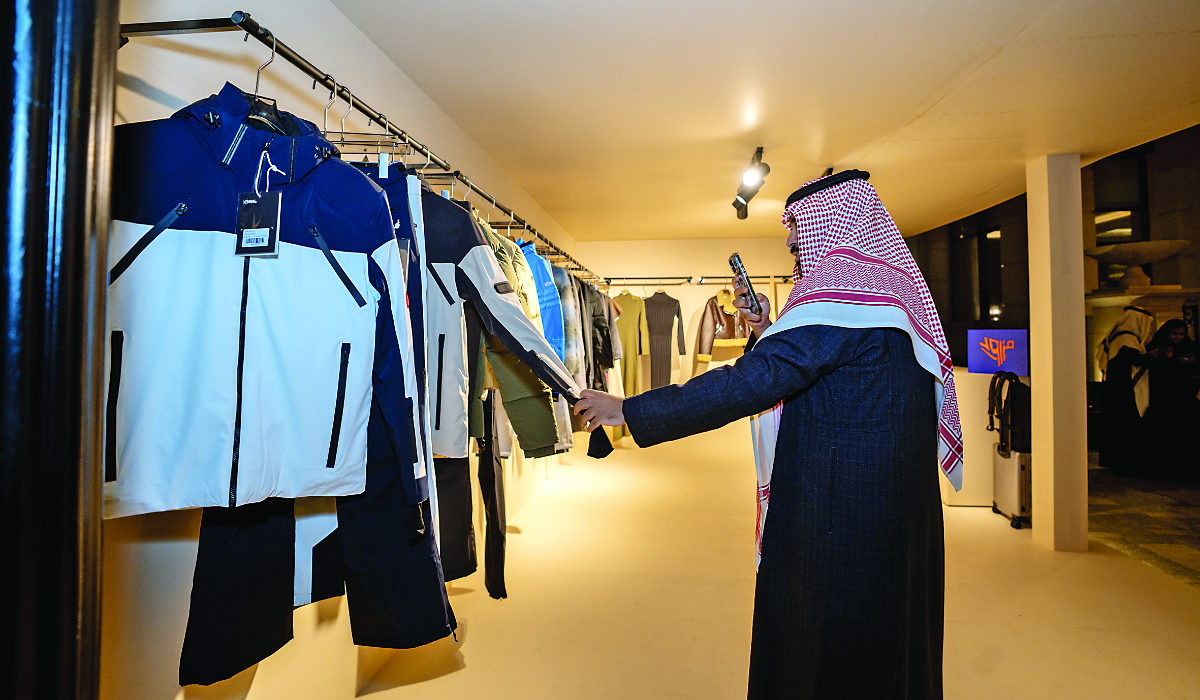
Also featured is Lynyer, a Lebanese brand by Leen Abelnour, who finds inspiration in Asian and Middle Eastern jewelry aesthetics and nature to create bold pieces.
“I ended up going for very big statement pieces that go with Middle Eastern women, and make women stand out wherever they are, especially for confident women who want to walk into the room and turn heads,” she said.
HIGHLIGHT
Maraya is the region’s first omni-channel platform with a Riyadh store, an e-commerce platform, and mobile app.
“All the pieces that you see here are nature inspired. They are also very culturally inspired by India, Pakistan, and by Lebanon, which is where I’m from.”
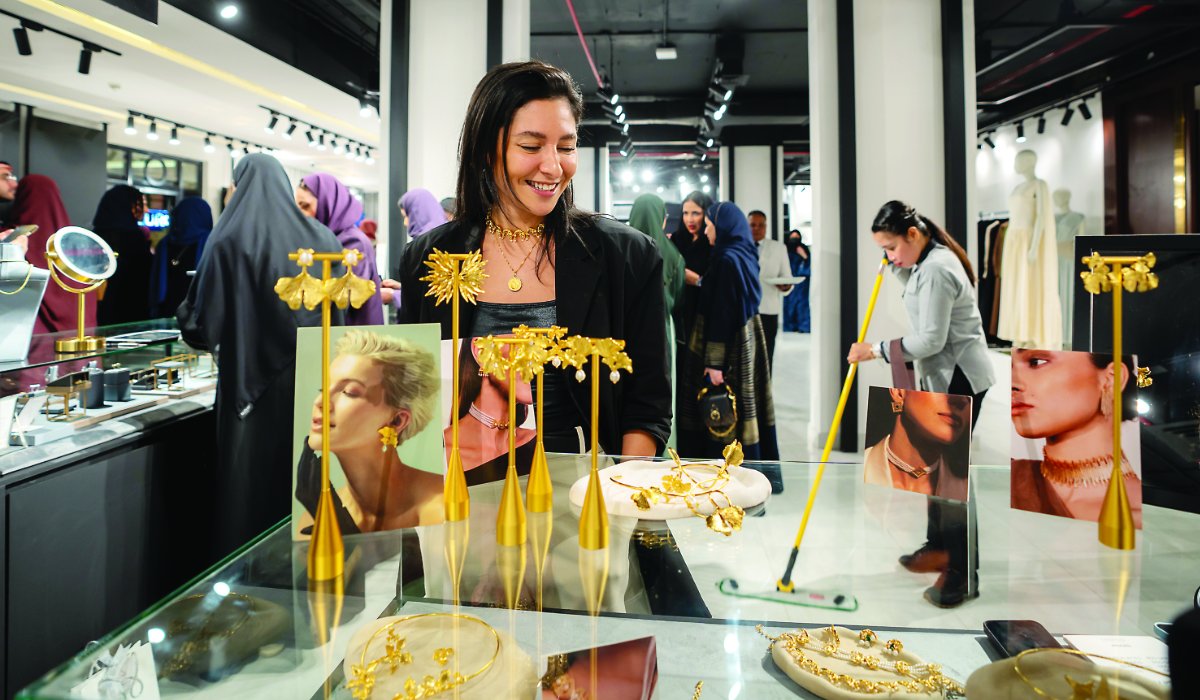
Growing up in the Kingdom and traveling internationally to pursue her career, Abelnour said that being back in Riyadh was a full-circle moment for her.
“When I launched the brand, I wanted to work with small artisans around the world … I started realizing that growing up in Saudi Arabia has really affected my taste in jewelry,” she said.
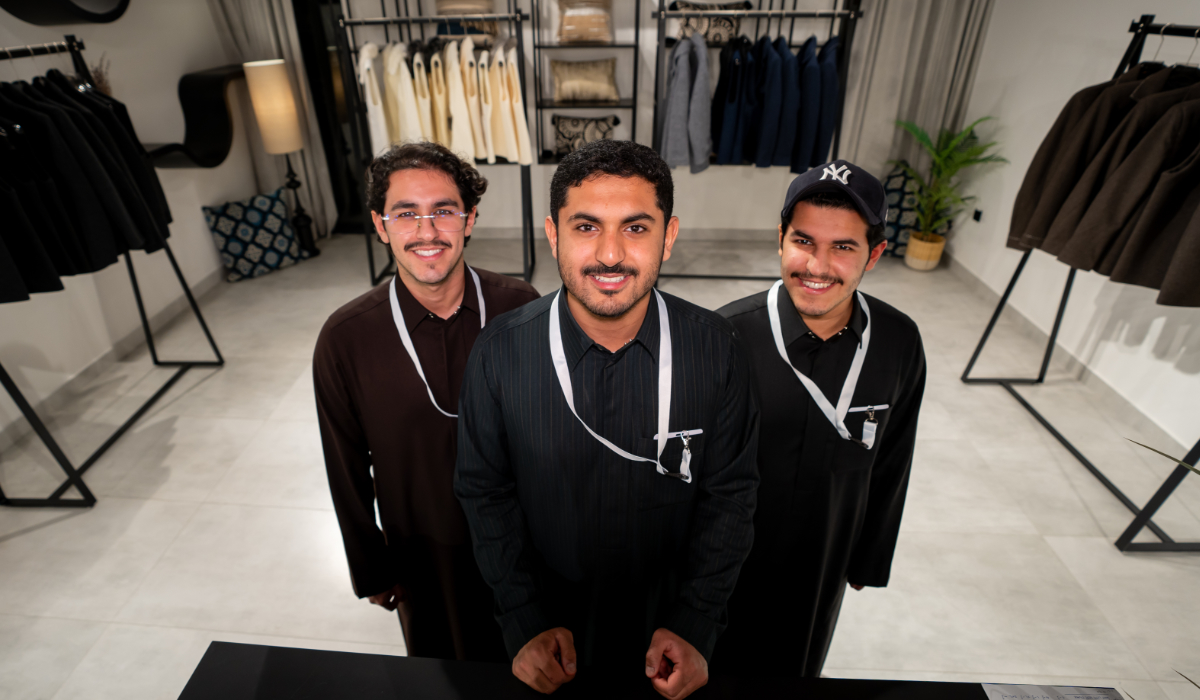
The founder of Saudi clothing brand Harjuss, Saud Saleh, said the label completes “basic, essential, human needs.”
Harjuss’s ready-to-wear collections are created around the seasons. The winter collection plays with texture and heavy fabrics while the summer line uses linen for breathability.
“It’s a very smart casual, very simple, very classy collection and it’s a 100 percent Saudi brand, founded by young Saudi talents,” Saleh said. “This is an honor to us to be representing the fashion industry of Saudi Arabia to the region and the outside world.”
Layali Maraya also featured Saudi labels 1886, Abadia, Dalal Jewelry, and Nora Alshaikh, among others.
Maraya is the region’s first omni-channel platform with a Riyadh store, an e-commerce platform, and mobile app.
The products offered by Maraya range from fashion and fragrance to accessories, jewelry and home decor.
Japanese ambassador visits Japan Cultural Days at Ithra

- Yasunari tours exhibits, drops in on sushi-making workshop
- Locals, expats and Japanese visitors try tea ceremonies and other activities
DHAHRAN: Japan’s ambassador to Saudi Arabia attended a cultural event in Dhahran on Monday as the two countries celebrate 70 years of diplomatic relations this year.
Ambassador Morino Yasunari toured various Japan Cultural Days exhibits at the King Abdulaziz Center for World Culture (Ithra), where events run until Feb. 8. The envoy even dropped in on a sushi-making workshop where Arab News was in attendance.
Communal tables were set up and a professional sushi chef instructed the 20 participants on how to prepare three kinds of sushi, using select ingredients. The ticketed class allowed sushi-lovers to roll out their own sushi and then eat it.

Those at the table joked that perhaps the ambassador popped in to see their work because he could not resist the delicious aromas coming out of the space.
One of those participants at the class was Danah Al-Harbi. The ambassador happened to visit her session, and she told Arab News that his visit showed his commitment to understanding the similarities between the two countries.
“It was honestly a completely new experience for us in the Eastern Province. It is the first time that Japanese culture is truly immersed at Ithra, and one of the most notable highlights of this event for me was the sushi-making experience.
Saudis that maybe did not go to Japan have a chance to taste the flavor of Japan. I hope to see you next time in Japan but today, you can come to Ithra.
Rieko Ono, Workshop facilitator
“I had to try it and it was truly exceptional. I love eating sushi, but I didn’t know how to make it until today,” Al-Harbi told Arab News. “Now, I can eat it after making it.”

Yasunari also visited the Japanese House experience where visitors took part in a traditional tea ceremony, serving and drinking matcha while making wagashi, the delicate, plant-based traditional Japanese confectionary crafted by hand to complement the unsweetened tea.
“The most interesting part is that I find something similar and also something in common between the two countries, Japan and Saudi, I found that the Arabic coffee and tea culture is something very close to each other, and we use this too for friendship and harmony,” Rieko Ono, who flew over from Tokyo to lead some of the workshops, told Arab News.
“I came to Saudi Arabia a few years ago, that was also fun, so it’s my second time and I love this. I’m very happy that Saudi Arabia is open now and so welcoming — I admire this.
“Saudi people love Japanese culture and anime helped us a lot,” she said. “Saudi people that maybe did not go to Japan have a chance to taste the flavor of Japan. I hope to see you next time in Japan but today, you can come to Ithra.”
Saudi sustainable fashion leaders honored at Riyadh awards ceremony

- Local brands AMUSED, Darah, and Asteri recognized for their efforts in green fashion
- Winners will attend a week-long mentoring program in Paris
RIYADH: Leaders in sustainable fashion in Saudi Arabia were honored at an awards ceremony in Riyadh on Monday.
Preowned luxury marketplace AMUSED, upcycling startup Darah, and sustainable makeup brand Asteri were the three winners of the inaugural Middle East Kering Generation Award.
The event was hosted by the French corporation that owns brands including Gucci and Balenciaga, in partnership with the Saudi Fashion Commission.
Rawan Alderaibi, CEO of Darah, spoke to Arab News about how she quit her corporate job to pursue her passion for fashion, before realizing that there was practically no secondhand market in Saudi Arabia.
“After exploring the idea further, I was led to an entrepreneurial incubator, developed the idea even further and came up with the idea of Darah — the circular model, where we start by reselling secondhand items … and upcycle some of the items into something more creative that makes people feel more unique and they only have one piece,” she said.
Darah buys clothing items by the kilogram: items in good conduction are sold as is, and the ones with some damage or issues are upcycled.
This idea has brought the startup some success and they now plan to expand into a recycling and local production factory.
AMUSED is a platform that connects buyers and sellers of previously owned, authenticated luxury items in Saudi Arabia. Mindful that fashion is the second-largest polluting industry in the world, AMUSED aims to create a more circular economy to break away from the make-use-dispose model that has dominated the fashion culture.
Sara Teymoor, co-founder of AMUSED, told Arab News: “It’s been five years of hard work creating this business and to receive the recognition for sustainability to us entrepreneurs is invaluable to our confidence and also to the connections, the mentorship and the opportunity that this award will bring us.
“We have a green field for fashion here in Saudi and we are now able to start with sustainability in mind. That is just priceless for our economy here in fashion and paving the way for our future generations.”
The third winner, Asteri, is one of the fastest growing makeup brands in the Middle East, designed specifically for the Arab woman. The company prides itself on its desert-proof, clean, and vegan products that also have sustainable and refillable packaging, certified by global nonprofit B Lab.
Burak Cakmak, the commission’s CEO, told Arab News: “I think for all of the winners, we’ve identified that there is a component of localized engagement, which is critical because we want to make sure that what is selected is going to succeed in the region.
“All of these three businesses were very much relevant to the Saudi context, and it was somewhat linked to Saudi lifestyle or culture or the environment, but also they were bringing something that doesn’t exist in the region, and different than what we are seeing necessarily in the rest of the world.”
The three winners will take a week-long trip to Paris, where they will have the opportunity to engage in exclusive mentoring sessions with Kering’s Sustainability teams.
Cakmak added: “I think Saudi has proven to the world that it’s the biggest growth opportunity as a market for many sectors when it comes to fashion and creativity.
“It’s also offering a lot of opportunities. We’ve seen in the past few years, as the Fashion Commission, the potential of the industry and the talent that exists, as well as a lot of the startups going into business in the country.
“We are very keen to engage the right partners who can help us in that journey and be able to bring the right perspective and the right support to a growing, prospering economy.”
Riyadh forum highlights healthcare model progress

- Forum’s scientific program began with the participation of more than 25 local and international speakers, 80 exhibitors and over 1,500 healthcare professionals
- Mohammed Al-Abdulaali: The Model of Care is confidently and clearly progressing through health clusters
RIYADH: The second Model of Care Forum was inaugurated in Riyadh on Tuesday under the patronage of Saudi Minister of Health Fahad Al-Jalajel.
The two-day event, held under the theme “Care and Impact,” was attended by Assistant Minister of Health Mohammed Al-Abdulaali.
The forum’s scientific program began with the participation of more than 25 local and international speakers, 80 exhibitors and over 1,500 healthcare professionals from across the Kingdom.
Al-Abdulaali highlighted the significant achievements of the modern healthcare model in Saudi Arabia, implemented through 20 health clusters, delivering integrated and sustainable care based on innovative, world-class practices.
“The Model of Care is confidently and clearly progressing through health clusters, extending its impact to encompass public healthcare providers alongside the private sector and other entities across the healthcare system,” he said.
Al-Abdulaali concluded his speech by welcoming all attendees and international speakers to witness the success stories achieved in Saudi Arabia through the implementation of the Model of Care across the 20 health clusters.
Discussions at the forum will revolve around the modern healthcare model, care systems and pathways such as palliative care, emergency care, outpatient care, maternal and child care, chronic disease care, preventive care systems, and their role in achieving health excellence.
The forum includes an accompanying exhibition showcasing success stories from the implementation of healthcare model initiatives across the Kingdom.




